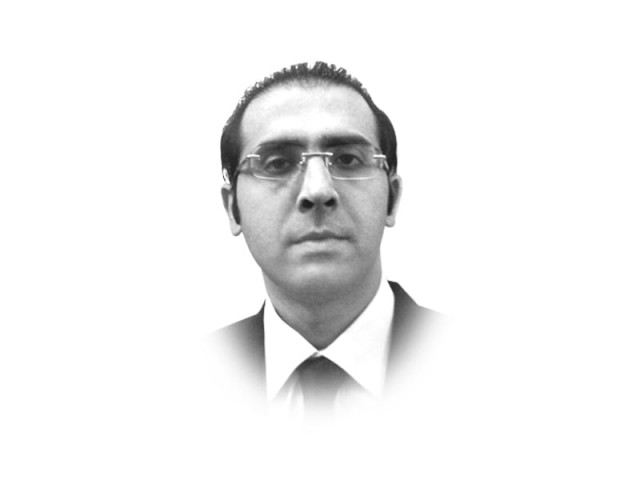Pious and Foolish
Intensity of present scrutiny is perhaps new, yet the idea behind it is controlled democracy, a mistrust of people.

The writer is a lawyer and partner at Ijaz and Ijaz Co in Lahore
saroop.ijaz@ tribune.com.pk
There is some rejoicing on Mr Jamshed Dasti being handed a prison term for a fake degree. Truth has prevailed, justice done and other such clichés. We, as a people, generally and institutions in particular, become particularly brave and our sense of fairness heightened against the weak. Never mind, General Musharraf roaming around as a free man, etc. Never mind, that the Honourable Supreme Court has declared the Commando an “usurper” and someone who has subverted the Constitution. We now wait with bated breath for the Supreme Court to bring General (retd) Pervez Musharraf to justice. Similarly, those held responsible for rigging an election in the Asghar Khan case are still comfortably outside of prison. There is a different standard of outrage for Generals Mirza Aslam Beg and Asad Durrani as compared with that for Dasti. Yet, how dare Dasti forge a degree? Again, never mind, the clearly undemocratic requirement of the graduation degree. Forgery and lying under oath should not be romanticised, yet celebratory spirit should, at least, be dampened. Education and tax evasion are major issues and need to be addressed, however, addressing them from a top-down model will not work. Listening to our media, it seems that members of parliament are the strong, the elite of this country.
Mr Ayaz Amir did not forge anything. He apparently opposes the “ideology of Pakistan”. Helpful to remember that ‘ideology of Pakistan’ is not an organic concept joined at birth with this country. It was formulated, quite later in the day by a military dictator and given mass publicity by the Jamaat-e-Islami (JI). Mr Amir rightly opposes the concept and does it with enviable eloquence. One of the leading intellectuals and writers in this country is not fit to contest the elections because he opposes a concept which is bunk. This is a joke, although a painfully unfunny one. A parliament without Ayaz Amir would indeed be poorer; however, an election arena where he is not allowed to contest is sheer lunacy.
Mr Dasti and Mr Amir were both refused permission on April 4. It is an important date to revisit our assumption of absolute power of the politician. On April 4, 1979, the most powerful politician that this country has seen and in my opinion the greatest, was hanged by a vile military dictator (who personally was from the humblest of backgrounds mind you). The custodians of ideology of Pakistan, the judges, complied, at least most of them, and became willing accomplices to murder. The gentleman and the pious crowd stood and watched as Zulfikar Ali Bhutto was murdered. So much, for the all-powerful politicians. April 4 is important also for acknowledging the genesis of this 62 and 63. It was the Sadiq and Ameen Ziaul Haq who killed Mr Bhutto. Shaheed Zulfikar Ali Bhutto and Mr Jinnah would have failed this vulgar test of proving their piety. A reminder of how cruel and murderous the pious can be. The same crowd, the same coalition is again hard at work today. The clean judges, generals and bureaucrats do not like the uncouth politicians. However, not all aspiring candidates are that unlucky. Mr Ahmad Ludhinavi, leader of the Ahle Sunnat wal Jamaat, has been declared Sadiq and Ameen and his nomination paper accepted. Allah be praised.
The intensity of the present scrutiny is perhaps new, yet the general idea behind it is as old as the country itself. That idea is controlled democracy, a mistrust of the people. The natives have never been trusted to make choices for themselves. Field Marshal Ayub Khan introduced EBDO (Elective Bodies Disqualification Order) with the clear intent of purifying Pakistani politics, which resulted in the disqualification of people such as Husain Shaheed Suharwardy. In the 1970s, the National Awami Party was banned for the reasons of being anti-Pakistan. In the 1980s, Ziaul Haq conducted a non-party election, resulting in the biradari system. In 2002, the Commando introduced the graduation requirement to ensure that only the enlightened make it to parliament. In a country where the overwhelming majority is illiterate, this is disenfranchisement. If the argument for the graduation requirement is accepted, then it cannot stop at that. Then why not masters or doctorate, in fact, why not specialist technocrats. In any event, the same fear of the uncouth, the corrupt politicians and also of the people who elect them is at display.
The present Election Commission, particularly the Chief Election Commissioner’s appointment was lauded almost unanimously, and rightly so. However, it seems that we, as a people, cannot absorb praise without becoming self-righteous. They say there is tyranny in purity. If there is an “ideology of Pakistan” and it is as fragile as making people sing a national anthem to defend it, which by the way is in Persian, then perhaps, it needs to be scrapped anyway. As a side point, compelling candidates to sing the national anthem might not be the best strategy complementing the attempt to bring the Baloch nationalists in mainstream national electoral politics.
The insistence by the Supreme Court and the Election Commission on the uprightness and piety of the candidates gives the impression of trying too hard. The people have to be trusted, for once, to make their own choices, perhaps even their own mistakes.
Published in The Express Tribune, April 7th, 2013.













COMMENTS
Comments are moderated and generally will be posted if they are on-topic and not abusive.
For more information, please see our Comments FAQ